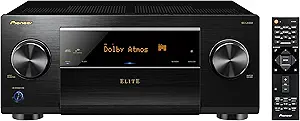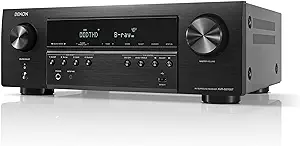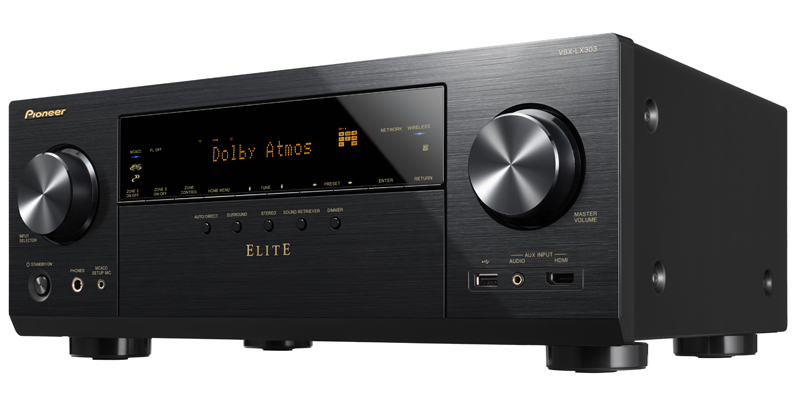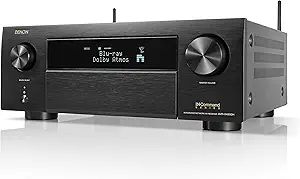Choosing the right AV receiver is crucial for any home entertainment setup, as it serves as the heart of your audio and video system. Among the top contenders in the market, Pioneer and Denon stand out as industry giants, known for their high-quality products and innovative features. In this article, we delve into a detailed comparison between Pioneer and Denon AV receivers to help you make an informed decision.
Product Selection
Marantz AV Receivers and Yamaha AV Receivers stand as prominent figures in the audio equipment realm, each presenting a diverse array of products with distinct advantages and functionalities. Marantz is renowned for its premium sound quality and compatibility with cutting-edge technologies like 8K Ultra HD, Dolby Atmos, and IMAX Enhanced. Their lineup caters to a wide spectrum of users, from entry-level enthusiasts to audiophiles, ensuring ample choices based on individual requirements and preferences. However, some users have expressed concerns regarding the complexity of Marantz AV receivers' setup and operation, which might pose challenges for those seeking a simpler experience. Conversely, Yamaha AV Receivers offer a comprehensive range of models equipped with features such as YPAO room optimization, MusicCast multi-room audio, and support for the latest 4K and HDR formats. Yamaha's receivers are praised for their intuitive user interface and straightforward setup process, making them a popular option among consumers prioritizing ease of use. Nonetheless, some users have observed that Yamaha AV receivers may not deliver the same level of sonic performance as top-tier Marantz models. Despite these differences, both Marantz and Yamaha maintain strong positions in the audio equipment market, offering a diverse selection to accommodate various user needs and preferences.
Availability
Yamaha AV Receivers and Onkyo AV Receivers are recognized leaders in the audio equipment sector, renowned for their top-tier quality and innovative technology. Both brands boast a robust presence in the market, with their products readily accessible through a variety of channels, including online platforms and brick-and-mortar stores. Yamaha, leveraging its MusicCast multi-room audio system, and Onkyo, with its AccuEQ calibration technology, continuously stay abreast of the latest advancements in audio innovation, ensuring their offerings remain highly sought after. However, differences in availability exist between the two brands. Yamaha AV Receivers enjoy a broader global distribution network, making them widely accessible in numerous electronics outlets and online marketplaces worldwide. Conversely, while Onkyo AV Receivers are also widely available, they may not be as prevalent in certain regions due to a slightly less extensive distribution network. Nonetheless, Onkyo has been expanding its reach, and consumers can easily find its products on various online platforms. Both brands offer a diverse lineup of receivers tailored to meet the diverse needs and preferences of consumers, offering an array of features and price points to cater to different budgets and requirements.
Design/Look
Marantz AV receivers stand out for their sophisticated and elegant design, seamlessly blending into any home entertainment setup. The latest models, such as the Marantz SR6015, feature a refined front panel adorned with a discreet display, tactile buttons, and a stylish volume knob, exuding a sense of luxury and craftsmanship. Typically available in black or silver finishes, Marantz receivers effortlessly complement various audio equipment aesthetics. However, some users have pointed out that the elegant design may sacrifice a bit of functionality, as accessing certain controls without the remote can be challenging. In contrast, Yamaha AV receivers, exemplified by the Yamaha RX-V6A, boast a more utilitarian yet modern design. With a larger display and an array of buttons on the front panel, Yamaha receivers offer straightforward access to essential controls, catering to users who prefer direct manipulation. Additionally, Yamaha provides models in various colors, including black, white, and titanium, allowing users to tailor their choice to match their home theater decor. Nonetheless, the bulkier appearance and busier front panel of Yamaha receivers may not suit those seeking a minimalist aesthetic. Ultimately, both Marantz and Yamaha excel in design, offering distinct options to cater to different consumer preferences and styles.
Price
Denon and Pioneer stand as prominent names in the AV receivers market, each offering distinct pricing strategies and product offerings. Denon AV receivers typically command higher prices, exemplified by models like the Denon AVR-X6700H, priced around $2500, which boast advanced features such as 8K video support and HEOS Built-in for wireless music streaming. These premium price points are justified by their cutting-edge technologies and superior audio quality. In contrast, Pioneer AV receivers are generally more budget-friendly, with models like the Pioneer VSX-534 priced at around $379, offering essential features like 4K video support and Dolby Atmos. While Pioneer receivers may not match the high-end audio quality of Denon, they still provide modern functionalities such as DTS:X and Bluetooth wireless technology at a more accessible price, appealing to budget-conscious consumers seeking a balance between affordability and performance.
Quality/Durability
Denon and Pioneer stand out as reputable names in the audio equipment sector, especially in the domain of AV receivers. Denon AV receivers are celebrated for their precision and fidelity in rendering high-resolution audio, incorporating cutting-edge technologies like Dolby Atmos, DTS:X, and Auro-3D for an enveloping auditory experience. Their robust build quality ensures longevity and reliability, although some users have encountered challenges with the user interface and software updates, potentially affecting usability. Conversely, Pioneer AV receivers also excel in sound quality and durability, boasting features such as Direct Energy amplification, MCACC sound optimization, and support for Dolby Atmos and DTS:X formats. While Pioneer receivers offer formidable performance, they might entail a more intricate setup process, and some users have noted a slight trade-off in audio detail compared to Denon counterparts. Ultimately, the choice between Denon and Pioneer hinges on individual preferences and specific needs, emphasizing the importance of considering factors beyond mere brand reputation.
Reputation
Denon and Pioneer stand tall as esteemed contenders in the audio equipment realm, particularly renowned for their AV receivers. Denon, originating from Japan, has carved a niche for itself with a legacy of delivering top-tier sound quality and pioneering features. Their latest offerings, exemplified by the Denon AVR-X3700H, boast cutting-edge technologies such as 8K support, immersive 3D audio formats, and sophisticated room correction software, elevating the auditory experience to new heights. Nonetheless, some users have encountered usability issues with the interface, and the premium price point may deter budget-conscious consumers. Conversely, Pioneer AV receivers, also hailing from Japan, are esteemed for their rugged construction and unwavering reliability. The latest models like the Pioneer VSX-LX504 tout features like Dolby Atmos, DTS:X, and IMAX Enhanced, ensuring a captivating sonic journey. Pioneer is further distinguished by its exceptional customer service and relatively affordable pricing compared to Denon. However, some users have noted a lack of advanced customization options compared to Denon's offerings. Amidst the crowded market, both Denon and Pioneer shine brightly, epitomizing a commitment to excellence, innovation, and customer satisfaction.
Warranty
Denon AV Receivers and Pioneer AV Receivers stand as prominent contenders in the audio equipment industry, celebrated for their excellence in sound quality and technological innovation. Regarding warranty coverage, the two brands present discernible disparities. Denon typically extends a warranty ranging from 2 to 3 years on their AV receivers, contingent upon the specific model and the purchaser's location. This warranty encompasses any material or workmanship defects, ensuring consumers receive prompt repair or replacement services if issues arise. Conversely, Pioneer AV Receivers typically feature a 1-year warranty period, marginally shorter compared to Denon. Nevertheless, Pioneer's warranty encompasses both parts and labor for repairs attributable to manufacturing defects. It's essential to note that the validity of both brands' warranties necessitates purchasing the product from an authorized dealer. While Denon holds a slight advantage with its lengthier coverage duration, both brands offer competitive warranties in comparison to others in the market. Prior to making a purchase, consumers are advised to thoroughly familiarize themselves with the terms and conditions of the warranty.
Easy To Use
Denon AV Receivers and Pioneer AV Receivers hold esteemed positions within the audio equipment realm, yet their user-friendliness presents notable distinctions. Denon's AV Receivers, exemplified by models like the AVR-X4700H, are recognized for their intuitive interface, featuring a setup assistant equipped with a sophisticated graphical user interface that seamlessly guides users through the setup process, catering especially to beginners. Additionally, Denon receivers support voice control via Amazon Alexa, Google Assistant, and Apple Siri, further enhancing accessibility. Nonetheless, some users have reported challenges with Denon's remote control, citing its complexity due to a multitude of buttons. Conversely, Pioneer AV Receivers, typified by offerings like the VSX-934, offer a comparable user-friendly experience. They boast a setup wizard that simplifies the setup process with step-by-step instructions, ensuring ease of use for users of all levels. While Pioneer receivers also support voice control with Google Assistant and Apple Siri, they lack compatibility with Amazon Alexa. Pioneer's remote control is often lauded for its simplicity, featuring fewer buttons and an intuitive layout, contrasting with Denon's more intricate design. However, some users have noted that Pioneer's user manual may lack clarity compared to Denon's, potentially complicating troubleshooting efforts.
Conclusion
In conclusion, both Pioneer and Denon AV receivers offer exceptional performance, advanced features, and premium build quality. Choosing between the two ultimately comes down to personal preference, budget, and specific requirements. Pioneer receivers may appeal to users seeking robust connectivity options and straightforward functionality, while Denon receivers are favored by those who prioritize intuitive user interfaces and sophisticated design elements. Whichever brand you choose, you can rest assured knowing that you're investing in a high-quality AV receiver that will elevate your home entertainment experience to new heights.




















